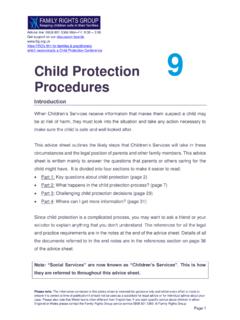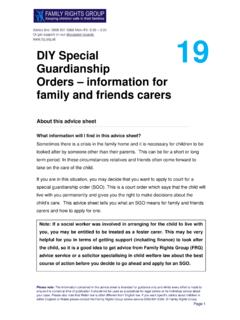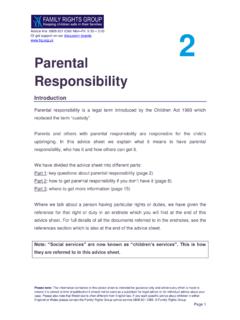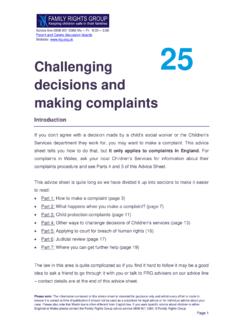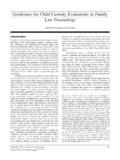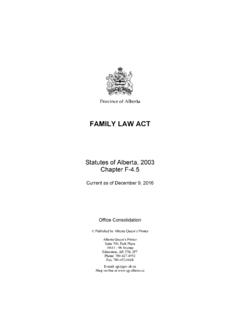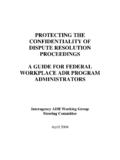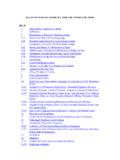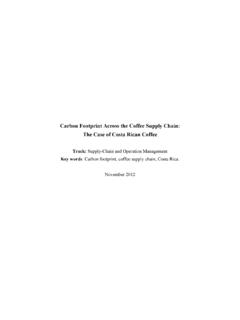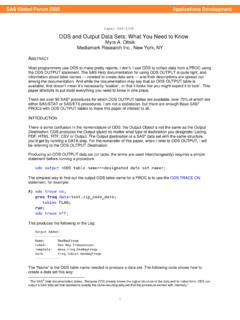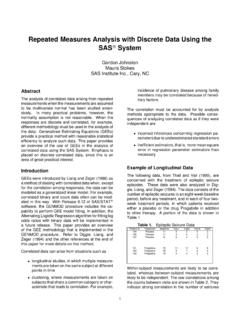Transcription of Or get support on our discussion boards. …
1 Please note: The information contained in this advice sheet is intended for guidance only and whilst every effort is made to ensure it is correct at time of publication it should not be used as a substitute for legal advice or for individual advice about your case. Please also note that Welsh law is often different from English law. If you want specific advice about children in either England or Wales please contact the Family Rights Group advice service 0808 801 0366. Family Rights Group Page 1 Care (and related) proceedings Introduction This advice sheet is written mainly for parents, or carers who are involved with Children s Services because social workers are concerned that their children may be at risk of harm. It gives you information about what will happen when Children s Services start care proceedings. The information should help you to work with your solicitor so you can tell the court what you think is best for your child.
2 It is long, because there is a lot of relevant information, so we have divided it into different sections: Part 1: Key information about what happens before care proceedings start Part 2: Emergency protection of vulnerable children Part 3: Care proceedings and the court process Part 4: Where to get more information Care proceedings are quite a complicated process and you may want to ask a friend, or your solicitor to explain anything in the advice sheet that you don t understand. You can also call Family Rights Group advice line for further information and advice (details at the end of this advice sheet). We have included the references for all the legal and practice requirements in endnotes which you can find at the end of the advice sheet. For full details of all the documents referred to in the endnotes, see the references section, also at the end of the advice sheet.
3 1551515 Advice line: 0808 801 0366 Mon Fri: 9:30 3:00 Or get support on our discussion boards. Please note: The information contained in this advice sheet is intended for guidance only and whilst every effort is made to ensure it is correct at time of publication it should not be used as a substitute for legal advice or for individual advice about your case. Please also note that Welsh law is often different from English law. If you want specific advice about children in either England or Wales please contact the Family Rights Group advice service 0808 801 0366. Family Rights Group Page 2 Note: Social services are now known as Children s Services . This is how they are referred to throughout this advice sheet. Key terms used in this advice sheet include: Child protection enquires: Children s services have a legal obligation to look into your child s situation if they receive information that makes them think that your child is at risk of significant harm.
4 This will normally involve them seeing your child unless they can find out enough information about them from other sources, for example by asking their teacher. In care means that the child is under an interim or full care order or an emergency protection order and is looked after by children s services Looked after means that the child is in care under a court order or is provided with accommodation by children s services under a voluntary arrangement, with the agreement of the parents/someone with parental responsibility Parental responsibility means the legal right to make decisions about a child s care. Parental responsibility is sometimes referred to as PR. (For more information on who has parental responsibility see FRG advice sheet on Parental Responsibility: Voluntary arrangement this means that there is an agreement between children services and the child s parent, or other person with parental responsibility, that the child should become looked after in the care system for a period of time.)
5 Sometimes this is known as voluntary accommodation and is sometimes referred to as section 20 accommodation in England (in Wales it may be referred to as section 76 voluntary arrangement. See Children looked after by children s services under a voluntary arrangement Please note: The information contained in this advice sheet is intended for guidance only and whilst every effort is made to ensure it is correct at time of publication it should not be used as a substitute for legal advice or for individual advice about your case. Please also note that Welsh law is often different from English law. If you want specific advice about children in either England or Wales please contact the Family Rights Group advice service 0808 801 0366. Family Rights Group Page 3 PART 1: KEY INFORMATION ABOUT WHAT HAPPENS BEFORE CARE PROCEEDINGS START Who can normally make decisions about my child s care? The right to decide how a child is raised and cared for belongs to anyone who has parental responsibility for them.)
6 Parental responsibility is defined on page 3. When can children s services get involved in arranging my child s care? Children s services (previously known as social services) are responsible for making sure that children are safe and well enough cared for by their parents or the person looking after them. Sometimes children s services receive information that makes them worry about a child s welfare. If they believe that your child may be harmed, they must take action to protect your child. Depending on the information they receive they may: make child protection enquiries and make plans to keep your child safe; or decide to apply straight to court if they think your child is or may be suffering harm and they can t be protected in some other way. However, it is important to note that: - Children s services must get the permission of the court to remove your child against your wishes. Here court means family court judges or magistrates who make decisions about children; and - the only time Children s services won t need either your or the court s permission remove your child is if they think your child is in immediate danger in which case they can ask the police to use their powers to keep them safe (for more information, see page 12 below).
7 What are child protection enquiries? Children s services sometimes receive information from a member of the public or another professional (such as a teacher or doctor) who thinks that your child may Please note: The information contained in this advice sheet is intended for guidance only and whilst every effort is made to ensure it is correct at time of publication it should not be used as a substitute for legal advice or for individual advice about your case. Please also note that Welsh law is often different from English law. If you want specific advice about children in either England or Wales please contact the Family Rights Group advice service 0808 801 0366. Family Rights Group Page 4 not be safe. In these circumstances they must make enquiries to find out if the child is safe and well cared for. These enquiries are called child protection enquiries or a child protection investigation or section 47 ( ) enquiries.
8 The aim of the enquiries is for children s services to: - gather information about your child s circumstances; - support you to care better for your child; and - decide whether they should take any action to keep your child safe or promote his/her welfare. This might include arranging a child protection conference to see if a child protection plan is needed for your child or holding a legal planning meeting to decide whether they need to start care proceedings to remove your child from home. For more information, see FRG advice sheet 9 on Child Protection Procedures Will my wider family be involved at this stage? If children s services are concerned enough about your child that a child protection plan is being drawn up, it is a good idea to involve any of your relatives and friends as soon as possible. They can help you to keep your child safe and if, for any reason, social workers think it is not safe for your child to remain with you, they may be able to look after your child instead of them going into care.
9 Government guidance says: It is important that wider family are identified and involved as early as possible as they can play a key role in supporting the child and help parents address identified problems. Where problems escalate and children cannot remain safely with parents, local authorities should seek to place children with suitable wider family members where it is safe to do so. 1 It is important that you tell the social worker straight away about any family members who can help you and to ask them to get in touch with the social worker direct. You can also ask the social worker to arrange a family group conference to help them to get involved in making safe plans for your child. Please note: The information contained in this advice sheet is intended for guidance only and whilst every effort is made to ensure it is correct at time of publication it should not be used as a substitute for legal advice or for individual advice about your case.
10 Please also note that Welsh law is often different from English law. If you want specific advice about children in either England or Wales please contact the Family Rights Group advice service 0808 801 0366. Family Rights Group Page 5 What is a family group conference? A family group conference (FGC) is a family-led decision-making process. The whole family comes together to make plans and decisions for a child who needs to be kept safe and able to thrive. Professionals (for example social workers) set out their key concerns which must be addressed in the plan at the start of the meeting. They are also involved in agreeing the plan for your child (provided it is safe) including any support children s services, will provide in the last stage of the meeting. FGCs are a good way of getting your wider family involved in trying to find solutions that will keep your child safe within the family.
